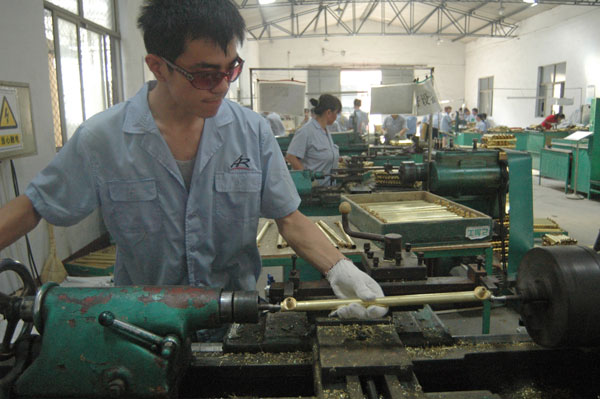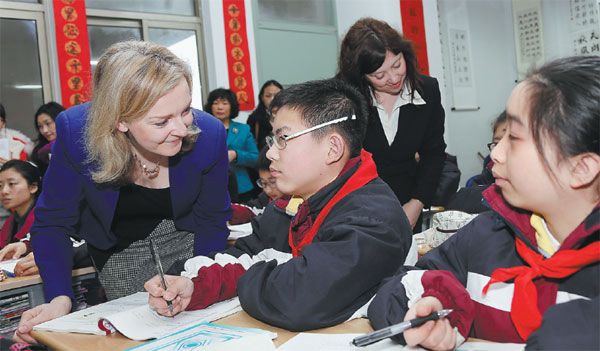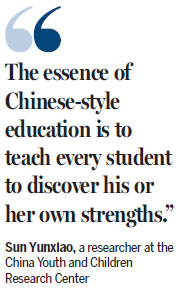Worlds apart and in a different class
Updated: 2015-08-10 07:44
By Zhang Zhouxiang and Zhang Chunyan(China Daily)
|
|||||||||||
|
Elizabeth Truss, a member of the United Kingdom Parliament, talks with a student at a middle school in Shanghai in February. Truss led a British education delegation on visits to three schools to gain insights into the city's successful math education program. Xu Wanglin / for China Daily |
A TV documentary that followed a group of teachers from China as they imposed Chinese methods on a class of teenagers in a state school in England has re-ignited a long-standing debate, as Zhang Zhouxiang and Zhang Chunyan report from London.
In the past few decades, China's rise to international prominence has prompted questions about the merits of the national education system compared with those used in the West, and its contribution to the country's rapid development.
Critics claim that Chinese teachers are too strict and fail to engage the students, preferring instead to force-feed knowledge that will help the children pass exams, but will have little application in the real world. By contrast, supporters say, the system produces diligent, respectful children who will grow into resourceful, dedicated members of adult society.
The debate has been re-ignited by a three-part BBC documentary Are Our Kids Tough Enough? Chinese School, which followed the travails of five Chinese teachers who spent a month working with 50 teenagers ages 13 and 14 at Bohunt School in the southern English county of Hampshire.
The first episode, broadcast on Aug 4, showed the students performing synchronized morning exercises,
participating in a long-distance running race, and learning how to exercise their eyes during breaks.
It was tough on the teachers too, because they had to expend a great deal of energy and time to simply keep the noisy children quiet, leading one to complain that the classroom was always "chaotic". For their part, many of the students complained that the teachers were too strict, the lessons were boring and they found it difficult to adapt to the new methods.
Serving social needs?
The difficulties were the results of cultural differences, according to Sun Jin, vice-professor of international and comparative education studies at Beijing Normal University. "Education serves social needs, and the system in each country simply produces graduates that fit that society. In one sense, both the Chinese and UK education systems are trying to cultivate things among students that their societies hold as virtues. While China has long pursued 'creativity' and 'critical thinking' in education, parents, teachers, and even company bosses still favor obedient students and employees," he said.
"People with innovative minds who are ready to defend their own opinions are more favored in Britain and Western countries as a whole; therefore their schools need to produce graduates with debating skills and rigorous minds," added Sun, who also conducts educational research in Germany.
One of the teachers, Li Aiyun, who has taught at the Nanjing Foreign Language School for 25 years, said she insisted on strict discipline because talking during class is disrespectful. "British students favor thinking and self-expression instead of simply obeying authority, while Chinese students are more disciplined," Li told the Chinese media.
Zou Hailian, who taught math and headed the teachers group, attributed the lack of discipline to the large class sizes in the UK. "They (British students) are more used to group discussions. When it becomes a 50-person class like the ones we handled, talking is rather destructive," said Zou, who attempted to organize a "responsibility council" in which students took turns to be on duty "so that they know they are a group".
Richard Spencer, a Daily Telegraph journalist whose children have attended schools in China, wrote: "It (the program) is, perhaps, the first to expose so clearly the differences in our schools to those in China, whose well-disciplined pupils are now in some cases two to three years ahead of our own in measurable subjects like maths and science."
Social network users in both countries criticized the students for their "lack of discipline and respect for other people".
Today's Top News
Greece, lenders in stretch run to to seal new bailout
State Council approves plan to overhaul SOEs, claims report
Amazing China 2015 photo contest unveiled in Beijing
China's HK CTS Metropark buys Kew Green, manager of Brighton's Grand Hotel
Chinese companies finding credibility abroad
Sun Yang is no-show for 1,500 free final at worlds
Measuring women's bust shows how dating is transforming
China rejects Philippine, Japanese, US claims on S. China Sea issue
Hot Topics
Lunar probe , China growth forecasts, Emission rules get tougher, China seen through 'colored lens', International board,
Editor's Picks

|

|

|

|

|

|








